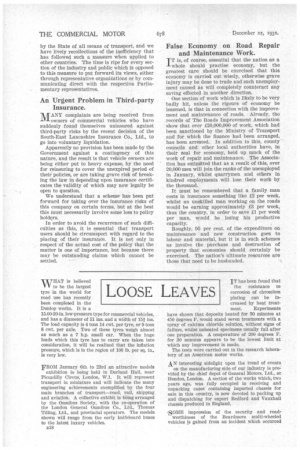London Transport Bill Opposition
Page 31

Page 32

If you've noticed an error in this article please click here to report it so we can fix it.
THE opposition to the London Passenger Transport Bill is steadily growing, and now some 140 Unionist Members of Parliament have signed a memorial, which has been forwarded to Mr. Baldwin, in which they state that they are of the opinion that the Bill should not be proceeded with.
Curiously enough, one of the organizers of this memorial is Colonel Wilfrid Ashley, the Minister of Transport who immediately preceded Mr. Herbert Morrison. Other organizers include Sir Vansittart Bowater (a former Lord Mayor of London) and Sir Cyril Cobb (of the London County Council).
The reasons for this move, which are• given in the memorial, are that it is a Socialistic measure, which was described by Mr. Morrison as the greatest Socialistic transport scheme ever placed before the country. It proposes to take the property of private owners from their control and gives them no option of sale, ' whilst vesting in the Minister of Transport powers which constitute him, and not a judicial tribunal, the court of appeal in such important matters as the provision or withdrawal of services and facilities.
On the prime issues, the Bill was passed in Select Committee by only five votes to four, whilst nothing that has taken place in Committee has modified thn main objections to it. When the National Government was first formed, it was stated that Bills of a controversial nature would not be proceeded with. This Bill, which is highly controversial, was, however, carried over to the new Parliament.
One of the reasons adduced in favour of the Bill is that it would enable new capital to be raised, but if it be passed it seems doubtful whether there will be any greater desire by the public to subscribe new capital for the undertaking, than exists under the present system.
The Bill, admittedly, sets up a "cast-iron monopoly," whereas it is clear that healthy competition between the buses, trams, tubes and underground railways has resulted in great improvements, cheap fares and increased-efficiency. It introduces a new principle, and inflicts an injustice upon owners of those transport undertakings which are to be expropriated. It insists that stock shall be taken and that no option of receiving cash shall be accorded. The importance of avoiding public ownership is clear, for the Bill is generally admitted to be the first of the Socialization schemes which are to be applied to transport, banking and other great businesses.
We have always been opposed to this Bill, partly because, if passed, it would set up a dangerous precedent which might eventually result in the ownership by the State of all means of transport, and we have lively recollections of the inefficiency that has followed such a measure when applied to other countries. The time is ripe for every section of the industry and public which is opposed to this measure to put forward its views, either through representative organizations or by communicating direct with the respective Parliamentary representatives.
An Urgent Problem in Third-party Insurance.
MANY complaints are being received from owners of commercial vehicles who have suddenly found themselves uninsured against third-party risks by the recent decision of the South-East Lancashire Insurance Co., Ltd., to go into voluntary liquidation. Apparently no provision has been made by the Government against a contingency of this nature, and the result is that vehicle owners are being either put to heavy expense, by the need for reinsuring to cover the unexpired period of their policies, or are taking grave risk of breaking the law in depending upon insurance certificates the validity of which may now legally be open to question. We understand that a scheme has been put forward for taking over the Insurance risks of this company on certain terms, but at the best this must necessarily involve some loss to policy holders. In order to avoid the recurrence of such difficulties as this, it is essential that transport users should be circumspect with regard to the placing of their insurance. It is not only in respect of the actual cost of the policy that the matter is one of importance, but because there may be outstanding claims which cannot be settled.
False Economy on Road Repair and Maintenance Work.
TT is, of course, essential that the nation as a -11-whole should practise economy, but the greatest care should be exercised that this economy is carried out wisely, otherwise grave injury may be done to trade and such unemployment caused as will completely counteract any saving effected in another direction. One section of work which is likely to be very badly hit, unless the rigours of economy be lessened, is that in connection with the improvement and maintenance of roads. Already, the records of The Roads Improvement Association show that over £20,000,000 of work, which had been sanctioned by the Ministry of Transport and for which the finance had been arranged, has been arrested. In addition to this, county-councils and other local authorities have, in their zeal for economy, held up much of the work of repair and maintenance. The Association has estimated that as a result of this, over 20,000 men will join the ranks of the unemployed in January, whilst quarrymen and others in kindred employments will lose their work by the thousand.
It must be remembered that a family man costs in insurance something like £2 per week, whilst an unskilled man working on the roads would be earning approximately £3 per week, thus the country, in order to save £1 per week per man, would be losing his productive capacity. Roughly, 95 per cent, of the expenditure on maintenance and new construction goes to labour and material, but it is in such schemes as involve the purchase and destruction of property that economies should certainly be exercised. The nation's ultimate resources are those that need to be husbanded.




























































































